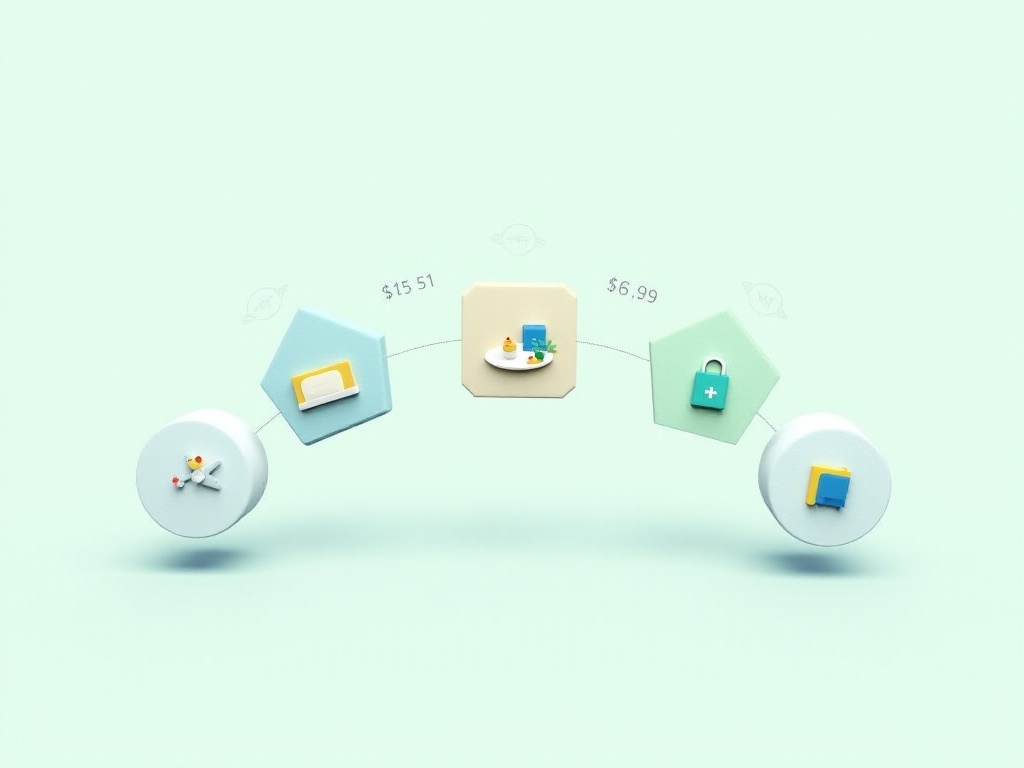Opening Words
As an experienced travel blogger who has visited over 30 countries, whenever I see friends posting travel photos, I always notice comments asking, "How much did this trip cost?" I understand everyone's urgent need to know about travel budgets - after all, who doesn't want to know how much money to prepare? Today, I'll share my exclusive travel budgeting tips to help you easily plan your next trip.
To be honest, when I first started traveling, I was also a "budget novice," often finding myself in awkward situations because I hadn't calculated costs properly. I remember once in Seoul, South Korea, I ended up eating convenience store sandwiches for the last few days because I hadn't planned my budget well. After accumulating experience from multiple trips, I finally developed a reliable budgeting method, and now I can always plan confidently before each trip.
Three Steps to Budgeting
Many people get overwhelmed when they hear about budgeting, and I understand that feeling. But don't worry, the method I'm about to share is super simple - I guarantee you'll know how to use it after reading! The entire budgeting process consists of three steps: setting expectations, researching, and leaving room for flexibility. Sounds simple, right? Let's look at each step.
First, let's talk about "setting expectations." This step is about determining what kind of experience you want from your trip. Do you want to stay in five-star hotels and enjoy a luxury vacation? Or do you want to experience hostel life and backpacking? This choice will directly impact your wallet.
Let me give you an example: if you choose the luxury route, accommodation might take up 40% or more of your total budget. Think about it - one night in a five-star hotel easily costs over 2,000 yuan, and when you add Michelin restaurants and spa treatments, the budget just keeps climbing. But if you choose the backpacker route, staying in hostels or regular guesthouses might only take up 15-20% of your budget, leaving more money for other interesting experiences.
The second step is "researching." This step is crucial! Before each trip, I spend a lot of time searching online for travel guides and looking at others' actual expenses. With today's abundant resources, there's lots of valuable information shared on major travel forums, Xiaohongshu, and Bilibili.
I suggest paying special attention to publication dates when researching, as prices change over time. For example, when I referenced last year's guide to Japan's Kansai region this year, many prices had increased by 20-30%. So always look for the most recent information to ensure your budget is more accurate.
The third step is "leaving room for flexibility." This is really important! I often see people calculating their budgets too tightly, leaving no room for adjustment. What if you encounter unexpected situations or see something you really want to buy, but have to regretfully pass it up because of insufficient budget? Isn't that a shame?
Major Expenses
Transportation Costs
When it comes to transportation costs, this is definitely one of the most headache-inducing expenses. Based on my years of experience, transportation usually takes up 25-35% of the total budget. This includes round-trip flights or train tickets, plus various transportation costs at your destination.
Let me share my experience. For Japan, if you book flights 3-4 months in advance, round-trip economy class usually costs between 2,500-3,500 yuan. But during peak season or last-minute bookings, prices can easily double. So I strongly recommend planning your itinerary early and booking tickets well in advance.
Regarding local transportation, many destinations offer transport passes. For example, while the JR Pass costs over 2,000 yuan, it's really worth it if you're traveling between cities. Last time I went to the Kansai region, I bought a Kansai Thru Pass, which allowed unlimited use of subways and buses, including round-trip airport transfers, saving me nearly 1,000 yuan.
Similarly, when traveling in Europe, consider buying a Eurail Pass if you're visiting multiple countries. Although the initial investment might seem large, it can really save money when used well. Last summer, I used a Eurail Pass to travel through France, Germany, and Italy, saving at least 2,000 yuan just on intercity transportation.
Local taxi costs also need consideration. In Southeast Asia, taxi fares are relatively cheap - in Thailand, a 10km Grab ride costs only 50-80 yuan. But in Western countries, taxis are much more expensive - the same distance might cost 200-300 yuan. So in these places, I recommend using public transportation, which is both environmentally friendly and economical.

Accommodation Costs
Accommodation costs are probably the most controllable part of the budget. Based on my experience, this typically takes up 20-40% of the total budget, with the specific percentage depending on your chosen accommodation type and the destination's price level.
Let me give you some specific examples. In Tokyo, if you choose to stay in a capsule hotel, you can manage with 200-300 yuan per night. While these accommodations are small, they have complete facilities and are usually well-located in the city center. If you want more comfort, mid-range business hotels cost about 800-1,200 yuan per night, with better facilities and more spacious rooms. As for five-star hotels, you'll need to prepare a budget of over 2,000 yuan per night.
In Europe, accommodation costs also vary greatly. In Paris, for example, a hostel bed in the city center costs 200-300 yuan per night, a regular three-star hotel costs 800-1,200 yuan, and better hotels easily cost over 2,000 yuan. However, I should mention that in Europe, you don't necessarily have to choose hotels - Airbnb is also a great option. Last time in Paris, I stayed in an Airbnb apartment, excellently located near the Eiffel Tower, for just over 600 yuan per night, and I could cook my own meals.
In Southeast Asia, accommodation costs are much lower. In Bali, for example, 200-300 yuan can get you a nice guesthouse, 400-600 yuan can get you a boutique hotel with a pool, and around 1,000 yuan can get you a beachside resort experience.
Daily Expenses
Food and Beverage Expenses
When it comes to food and drinks, this is what many people find most perplexing. After all, who doesn't want to enjoy good food while traveling? But since budgets aren't unlimited, this part really needs careful planning.
Let me share the dining expenses in different regions. In Southeast Asia, such as Thailand and Vietnam, food is really cheap. A meal at a street stall costs just 20-30 yuan, and you can eat well at a regular restaurant for 50-80 yuan. If you want to treat yourself, 200 yuan can get you a very nice restaurant meal.
But in Japan, dining costs are higher. Generally, a convenience store meal costs about 40-60 yuan, a regular ramen shop or set meal restaurant costs 80-120 yuan per meal, and slightly better restaurants cost over 200 yuan. If you want to experience local specialties like sushi or kaiseki cuisine, the budget needs to increase - these easily cost 500-1,000 yuan per meal.
Western countries have even higher dining costs. In the United States, for example, a fast food meal costs 60-80 yuan, a regular restaurant meal normally costs 150-200 yuan, and at slightly better restaurants, 300-500 yuan per person isn't unusual. In Nordic countries where prices are particularly high, even a casual lunch might cost 200-300 yuan.
However, there's no need to worry too much, as there are many money-saving tips. For instance, if your accommodation has a kitchen, you can cook your own meals. Buying bread and fruit from the supermarket for breakfast is also a good choice. For lunch, you can choose restaurants frequented by locals - you'll experience local cuisine at reasonable prices. For dinner, you might splurge on one or two more expensive meals to really enjoy yourself.
Entertainment Expenses
This part is the hardest to estimate because everyone's interests really differ greatly. Some people like visiting museums, others prefer experiencing local activities, and some just love shopping. However, based on my experience, I recommend setting aside at least 15-20% of your total budget for attraction tickets and experience activities.
Let me give some examples. In Bali, a water activity like snorkeling or banana boat riding costs between 400-600 yuan. If you want to take a yoga class, it's 200-300 yuan per session. For spa services, basic massages cost 300-400 yuan, while better treatments cost 500-800 yuan.
In Japan, most temples and shrines are free to visit, but some famous attractions do charge admission. For example, Kinkaku-ji in Kyoto costs 400 yen (about 25 yuan), and Kiyomizu-dera also costs 400 yen. If you want to experience kimono rental, basic packages cost 3,000-4,000 yen (about 180-240 yuan), while better packages cost 6,000-8,000 yen (about 360-480 yuan).
In Europe, many museum tickets aren't cheap. In Paris, for example, the Louvre costs 17 euros (about 140 yuan), and the Arc de Triomphe costs 13 euros (about 105 yuan). However, many cities offer museum passes that allow you to visit multiple attractions within a fixed time period, which is very cost-effective.
Emergency Preparation
This part is really important, but many people tend to overlook it. I recommend setting aside at least 10-15% of your total budget as emergency funds. Why so much? Because you can encounter all sorts of unexpected situations while traveling.
Let me share some real cases I've experienced. Last year in Thailand, we suddenly encountered heavy rain, and what was planned as walking or taking buses had to be changed to taking taxis, instantly adding over 200 yuan in expenses. Another time in Japan, because we didn't pay attention to the time, we missed the last subway and had to take a taxi back to the hotel, costing nearly 1,000 yen.
Besides transportation-related unexpected expenses, you might encounter other emergencies. For instance, getting sick abroad and needing to see a doctor, or having to buy a new suitcase if yours breaks - these all need to be budgeted for. I have a friend who lost their passport in Italy, and just getting a temporary travel document cost several hundred yuan.
Another thing to note is exchange rate fluctuations. If you exchange currency in advance and find significant rate changes when you arrive at your destination, this can affect your budget. That's why having emergency funds is really necessary.

Smart Savings
After discussing so much about budget allocation, let me share some practical money-saving tips.
First is choosing your travel time. Avoiding peak seasons can really save a lot of money. For example, during Japan's cherry blossom and autumn leaves seasons, flight and accommodation prices are generally 30-50% higher than usual. European summer (July-August) is also peak season, with prices much higher than off-season. If you have flexible timing, I recommend traveling during off-season - it's not only cheaper, but there are fewer people, making for a better experience.
The second tip is booking in advance. Many attractions and activities now offer early bird discounts. For example, Disneyland tickets purchased 30 days in advance are usually 10-20% cheaper than buying on-site. The same goes for accommodation - booking 3-4 months ahead is usually much cheaper than last-minute bookings.
The third tip is making good use of various coupons and discount cards. Many cities have tourist discount cards, like Osaka's "Osaka Amazing Pass," which offers free entry to many attractions plus unlimited subway and bus rides. In Europe, many cities have similar City Cards - while buying the card requires some investment, it's very cost-effective if you plan to visit many attractions.
Also, pay attention to promotional information. Airlines occasionally offer special fare tickets, and hotels often have promotional activities. I usually follow several travel-related public accounts and apps, and grab good deals as soon as I see them.
The last tip is making good use of credit card points and miles. If you travel frequently, consider getting an airline co-branded credit card. Points accumulated from daily spending can be redeemed for flights or upgrades, saving quite a bit of money. Some credit cards also offer cashback or double points for overseas spending - these are all benefits worth utilizing.

Concluding Thoughts
Honestly, while budgeting might sound boring, it's really one of the most important preparations for travel. Think about it - when you have a clear idea of how much you're going to spend, doesn't the whole travel experience become more relaxed and enjoyable?
I remember my first solo international trip - because I hadn't done proper budgeting, I spent the entire journey worried about running out of money. Later, as I learned to budget, planning out all expenses clearly before each trip, my travel experiences really improved a lot.
Actually, a budget isn't a restriction, but rather something that makes our travels more planned. Reasonable budgeting allows us to do more of what we want while traveling, instead of being constrained everywhere due to poor financial planning. I hope this article helps everyone make better budget plans for their next trip.
Finally, I particularly want to say that everyone's travel style and budget are different, and you shouldn't worry too much about others' standards. What's important is finding what works for you and making travel a joyful thing. What do you think? Feel free to share your budgeting experiences in the comments.


